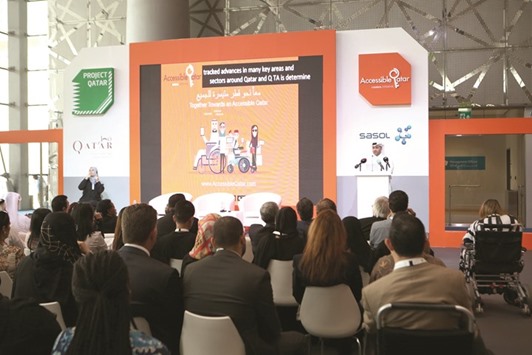The number of stars a hotel has is directly affected by how accessible it is, the Qatar Tourism Authority (QTA) has said, highlighting the significance attached to accessibility in the hospitality sector in the country.
QTA director of planning and quality Nasser al-Maslamani made the observation on the opening day of the Accessible Qatar Conference.
Under the patronage of HE the Prime Minister and Minister of Interior Sheikh Abdullah bin Nasser bin Khalifa al-Thani, the two-day conference opened at Doha Exhibition and Convention Centre yesterday.
The conference is taking place as part of Project Qatar 2017, the 14th International Construction Technology and Building Materials Exhibition.
It will cover accessibility-related issues across various sectors such as tourism, architectural design, sports projects, work environment and inclusive urban development.
The event, organised by Sasol and powered by IFP, was officially inaugurated by al-Maslamani and Phinda Vilakazi, president of GTL Ventures at Sasol Qatar.
The most accessible venues in Qatar will be awarded today.
In his speech, al-Maslamani recalled that they were delighted when approached by Sasol Qatar to support its pioneering initiative – Accessible Qatar – which helps amplify the voice of the disabled community in Qatar and ensure that their needs are at the forefront of major initiatives.
QTA’s support of the initiative began with the development of the Accessible Qatar mobile application, he noted.
“Today, I am honoured to announce that we will be continuing this partnership, and with it our commitment to accessibility, beyond today’s conference,” al-Maslamani said. “We will be working with Accessible Qatar’s experts to analyse the accessibility of the exhibitions that take place in Qatar, with the view to ensuring that business events that are licensed by QTA are accessible to all.”
Al-Maslamani said the 2022 FIFA World Cup has fast-tracked advances in many key areas and sectors around Qatar, and QTA is determined to ensure that one of the legacies of this development should be an “authentic, thriving, sustainable and accessible” tourism sector.
The hotel grading and classification system places accessibility guidelines, drafted in accordance with international best practices, at the core of development plans for all hospitality establishments in the country, he pointed out.
“In simple terms, for the first time in Qatar, the number of stars a hotel has is directly affected by how accessible it is.”
Al-Maslamani revealed that by the end of last year, licensing and inspection teams completed their onsite inspections of all 4- and 5-star hotels in the country.
Those that need to are now working on making the required adjustments to maintain or improve their classification by adhering to the new grading and classification criteria.
“This year, we are working to complete the inspection of all 3-, 2- and 1-star hotels, and by 2018, we aim to have completed the inspections of all hotel apartments,” the official added.
The new QTA guidelines also mandate that hospitality staff members are trained to manage and meet the requirements of guests with special needs.
“We are committed to working with all of our partners in both the public and private sectors to ensure that the tourism and hospitality sectors are held to the standards that befit our country and our visitors.”
Some workshops were held on the opening day of the conference.

The Accessible Qatar Conference under way.


